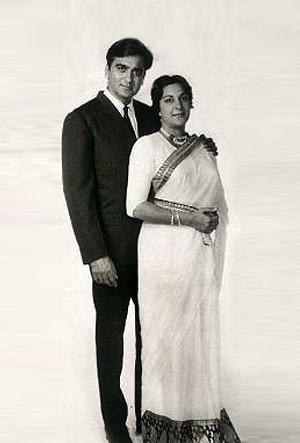A female actor with a successful career, occasionally contemplating death to escape her empty life and a futile relationship. A young, upcoming star who carries her away to safety from a set engulfed in cathartic fire. And the beginning of endless love. That is how Nargis and Sunil Dutt’s story began along with an unbroken chain of discreet letters and telegrams the two sent to each other. The excerpts from some of their letters are recalled by Kishwar Desai in her book Darlingji — the true love story of Nargis and Sunil Dutt.
Their letters and telegrams (which were in a code language) capture his insecurities, her fears and their urgent desire to spend the rest of their lives with each other despite obvious odds. ‘Darling ji’ was just one of their many endearments for each other and their letters revealed their true selves to each other and decades later to those reading about them. That is what letters do, or used to. Make the writer’s soul visible.
**
Sample the intensity and depth in the letters written by artist Imroz and poetess Amrita Pritam to each other. She, already a legend in the making. He, a struggling artist who would see her pass by from his window and want to be her Dr Dev, a male protagonist she had spun in her fiction out of her longing.The man she had not found yet but was searching for. Their letters to each other are translated and compiled by Uma Trilok in the book Amrita and Imroz: In the Times of Love and Longing. The remarkable thing about these letters is that the two are oblivious to everything except each other. She is not aware of her status as the strongest female voice in Punjabi literature.
**
She knows only that she is seven years older than him and wishes ardently she was younger. He, blinded by her brilliance and desperately in love, once writes, “I did not know she would take away so much from me — the meaning of my existence, my peace, my enthusiasm for life — just everything is lost. But I will not lose heart. I will not remain quiet. I will earnestly look for the one who has taken all that away — maybe I will go to the limit of courage, till the limits of sight, till the limit of imagination and even till the limit of life. I will try and find her and I am sure of my success.”
**
Life for him was a series of “unfinished paintings.” He wrote, “Do have a good look at them — the moment your eyes fall on them, they become ‘paintings’, otherwise they are nothing but dead lines going from nowhere to nowhere.”
**
Not all love stories however grow beyond letters. It is curiously touching that beyond the labels of intellectual, existentialist philosopher, political activist, feminist and social theorist, Simone de Beauvoir was also simply a woman in love. Who wrote once to American writer Nelson Algrene on the edge of a rupture, “I am better at dry sadness than at cold anger, for I remained dry eyed until now, as
dry as smoked fish, but my heart is a kind of dirty soft custard inside. I am not sad. Rather stunned, very far away from myself, not really believing you are now so far, so far, you so near. “
**
Beauvoir however was also sent beautiful missives by a man who was her intellectual equal. Jean Paul Sartre once wrote to her,”Tonight I love you in a way that you have not known in me: I am neither worn down by travels nor wrapped up in the desire for your presence. I am mastering my love for you and turning it inwards as a constituent element of myself. This happens much more often than I admit to you, but seldom when I’m writing to you. Try to understand me: I love you while paying attention to external things. At Toulouse I simply loved you. Tonight I love you on a spring evening. I love you with the window open. You are mine, and things are mine, and my love alters the things around me and the things around me alter my love.”This 51 year old relationship had many open ends and dark corners but perhaps it was this ability to lay their soul bare and express the inexpressible that kept these two mercurial, brilliant people together for so long .

with
The New Indian Express Reema Moudgil works for The New Indian Express, Bangalore, is the author of Perfect Eight, the editor of Chicken Soup for the Soul-Indian Women, an artist, a former RJ and a mother. She dreams of a cottage of her own that opens to a garden and where she can write more books, paint, listen to music and just be.
 with The New Indian Express Reema Moudgil works for The New Indian Express, Bangalore, is the author of Perfect Eight, the editor of Chicken Soup for the Soul-Indian Women, an artist, a former RJ and a mother. She dreams of a cottage of her own that opens to a garden and where she can write more books, paint, listen to music and just be.
with The New Indian Express Reema Moudgil works for The New Indian Express, Bangalore, is the author of Perfect Eight, the editor of Chicken Soup for the Soul-Indian Women, an artist, a former RJ and a mother. She dreams of a cottage of her own that opens to a garden and where she can write more books, paint, listen to music and just be.






so beautiful…i wish we could have so much of love understanding ..despite our obvious odds.. jus loved it.
An extraordinary article. I loved reading up the excerpts. What an exchange between Sartre and Beauvoir..
A humble and ardent suggestion – DO a series on such iconic love letter exchanges, through the various phases of history, different geographies, etc.